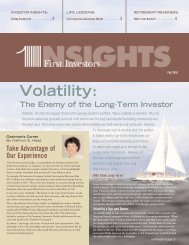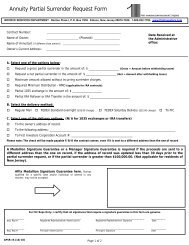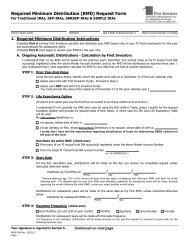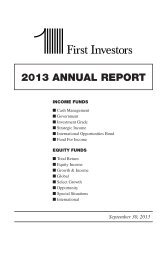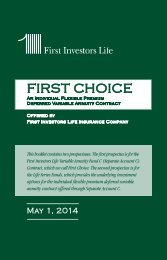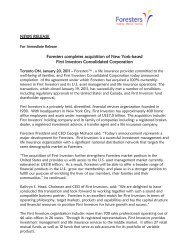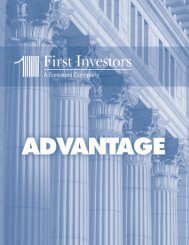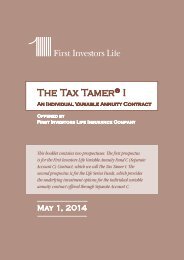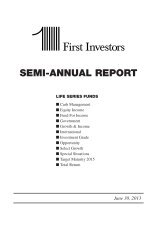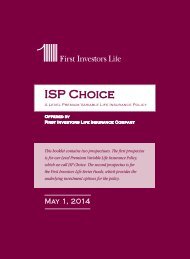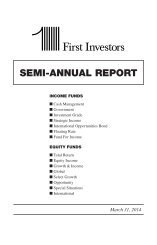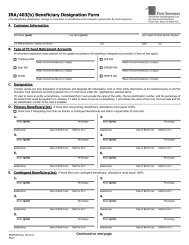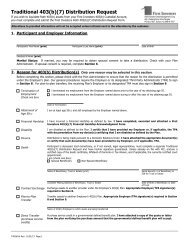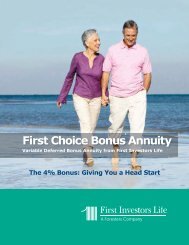A Q&A regarding the new Form 1099-B and cost ... - First Investors
A Q&A regarding the new Form 1099-B and cost ... - First Investors
A Q&A regarding the new Form 1099-B and cost ... - First Investors
You also want an ePaper? Increase the reach of your titles
YUMPU automatically turns print PDFs into web optimized ePapers that Google loves.
1. Why have <strong>cost</strong> basis reporting requirements been changed<br />
The requirements for reporting <strong>cost</strong> basis information to <strong>the</strong> IRS have been changed by <strong>the</strong> IRS in an<br />
effort to reduce <strong>the</strong> underpayment of capital gains taxes. The misplacement of records for long-held<br />
investments, as well as incomplete records <strong>regarding</strong> shares received as a gift or inheritance, can lead<br />
to incorrect reporting of a shareholder’s <strong>cost</strong> basis. The <strong>new</strong> requirements are intended by <strong>the</strong> IRS to<br />
alleviate such errors for purchases made after <strong>the</strong> effective date.<br />
Return to Top<br />
2. Is <strong>the</strong> calculation of <strong>cost</strong> basis a <strong>new</strong> requirement for shareholders<br />
No. Shareholders have historically been required to calculate <strong>the</strong>ir <strong>cost</strong> basis <strong>and</strong> report capital gains<br />
or losses on Schedule D of <strong>the</strong>ir Federal <strong>Form</strong> 1040. In addition, shareholders have been required to<br />
report whe<strong>the</strong>r shares sold were held long-term or short-term.<br />
Return to Top<br />
3. What types of accounts are subject to <strong>Form</strong> <strong>1099</strong>-B/<strong>cost</strong> basis reporting<br />
Generally, most non-retirement accounts, excluding money market <strong>and</strong> Education Savings Accounts,<br />
are subject to <strong>Form</strong> <strong>1099</strong>-B/<strong>cost</strong> basis reporting.<br />
Return to Top<br />
4. Where do I report <strong>cost</strong> basis information on my tax form<br />
Cost basis information is generally reported on IRS <strong>Form</strong> 8949 <strong>and</strong> Schedule D of IRS <strong>Form</strong> 1040.<br />
Your qualified tax advisor can offer assistance in this regard.<br />
Return to Top<br />
5. What are covered shares<br />
Covered shares are those shares that are “covered” by <strong>the</strong> <strong>new</strong> reporting requirements. Covered<br />
shares are generally shares acquired in a non-retirement account, o<strong>the</strong>r than a money market or<br />
Education Savings Account, on or after January 1, 2012, for which a mutual fund company has<br />
accurate basis information.<br />
Return to Top<br />
6. What are noncovered shares<br />
Noncovered shares are those shares that are not “covered” by <strong>the</strong> <strong>new</strong> reporting requirements.<br />
Noncovered shares are generally shares acquired prior to January 1, 2012 <strong>and</strong> any shares for which a<br />
mutual fund company does not have accurate basis information.<br />
Return to Top<br />
7. Why do I own both covered <strong>and</strong> noncovered shares <strong>and</strong>, if average <strong>cost</strong> applies, why do <strong>the</strong>y<br />
have a different average <strong>cost</strong> per share<br />
Return to Top<br />
8. Can I choose to have all of <strong>the</strong> shares in an account treated as covered shares<br />
No, you cannot make an election to have <strong>First</strong> <strong>Investors</strong> treat all shares in an account as covered<br />
shares.<br />
Return to Top



